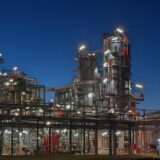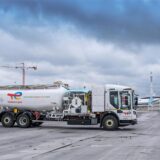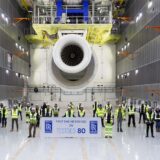
Study shows significant emission cuts with 100% sustainable aviation fuel
The world’s first in-flight study of a commercial aircraft using 100% sustainable aviation fuel (SAF) has revealed significant reductions in non-CO2 emissions. Conducted using an Airbus A350 aircraft, the study demonstrated a considerable decrease in soot particles and contrail ice crystals compared to conventional aviation fuel, marking a breakthrough in sustainable aviation.
The ECLIF3 study, a collaboration between Airbus, Rolls-Royce, the German Aerospace Center (DLR), and SAF producer Neste, aimed to measure the environmental impact of using 100% SAF in both engines of the Airbus A350, powered by Rolls-Royce Trent XWB engines. The findings showed a 56% reduction in the number of ice crystals per mass of SAF consumed, which could significantly reduce the climate-warming effects of contrails.
Global climate model simulations by DLR estimated a 26% reduction in the climate impact of contrails when using 100% SAF compared to conventional Jet A-1 fuel. These results underscore the potential of SAF to mitigate aviation’s climate impact by reducing both CO2 and non-CO2 emissions.
Key findings and impact
- Soot and Contrail Reduction: The study recorded a substantial reduction in soot particles and contrail ice crystals, contributing to lower climate-warming effects.
- Contrail Climate Impact: The simulations indicated a 26% decrease in contrails’ climate impact with 100% SAF.
- Short-Term and Long-Term Benefits: SAF is recognised for its ability to reduce both immediate non-CO2 effects like contrails and long-term CO2 emissions, promoting a more sustainable aviation industry.
Alexander Kueper, vice president of Renewable Aviation Business at Neste, highlighted the importance of the study: “The results from the ECLIF3 study confirm a significantly lower climate impact when using 100% SAF due to the lack of aromatics in Neste’s SAF used, and provide additional scientific data to support the use of SAF at higher concentrations than currently approved 50%.”
”The results from the ECLIF3 flight experiments show how the use of 100% SAF can help us to significantly reduce the climate-warming effect of contrails, in addition to lowering the carbon footprint of flying—a clear sign of the effectiveness of SAF towards climate-compatible aviation”, said Markus Fischer, DLR Divisional board member for Aeronautics.
“We already knew that sustainable aviation fuels could reduce the carbon footprint of aviation. Thanks to the ECLIF studies, we now know that SAF can also reduce soot emissions and ice particulate formation that we see as contrails. This is a very encouraging result, based on science, which shows just how crucial sustainable aviation fuels are for decarbonizing air transport,” said Mark Bentall, head of Research & Technology Programme, Airbus.
Industry collaboration and future implications
The ECLIF3 program, which included contributions from the National Research Council of Canada and the University of Manchester, involved extensive in-flight emissions tests and ground tests conducted in 2021. The research team reported its findings in the Copernicus journal Atmospheric Chemistry & Physics, providing the first in-situ evidence of the climate impact mitigation potential of using pure 100% SAF on a commercial aircraft.
Alan Newby, Rolls-Royce Director of Research & Technology, emphasized the broader impact: “Using SAF at high blend ratios will form a key part of aviation’s journey to net-zero CO2. Not only did these tests show that our Trent XWB-84 engine can run on 100% SAF, but the results also show how additional value can be unlocked from SAF through reducing non-CO2 climate effects as well,” said Alan Newby, Rolls-Royce, director, Research & Technology.














